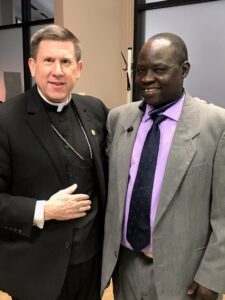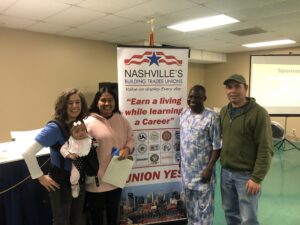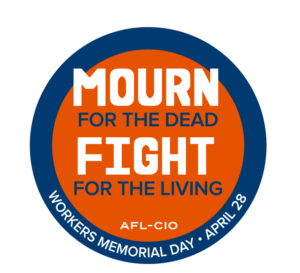Workers’ Memorial Day Homily by Fr. Clete Kiley, UNITE HERE
The Catholic Labor Network observed Workers’ Memorial Day on April 28, 2020 with a Mass remembering the thousands of workers who die on the job each year — including, this year, so many felled by covid-19. Fr. Sinclair Oubre (Seafarers) was our celebrant, while Fr. Clete Kiley (UNITE HERE) offered the homily. You can view highlights from the Mass on the CLN YouTube Channel. Below find the text of Fr. Kiley’s homily.
More than 125 years ago in his groundbreaking Encyclical Rerum Novarum, Pope Leo XIII exhorted Catholic bishops and their clergy “to go to the worker”. And he promised working people all over the world they should always count on the pastoral solicitude of the Church. Today in this mass we gather as a testimony to that pastoral solicitude. We are grateful to the Catholic Labor Network for bringing us together. We come together today virtually in a mass we are celebrating from different parts of the country – all reflective of this challenging time of COVID-19 pandemic and economic upheaval.
For more than 129 years the Church and the Labor Movement have been building bonds to serve the Common Good, to promote solidarity, and to incarnate the principle of subsidiarity in the formation of local labor unions. Both the Church and the Labor Movement believe in the right — and actually fight for the right — of workers to form unions, to bargain collectively, to secure a living wage (not a minimum wage), and to be able to work in safe places. In these difficult times this Church-Labor collaboration is more important than ever.
In our Holy Mass today Church and Labor come together to remember those union members who have died in the past year. In a special way we remember those who have succumbed to the COVID-19 virus in these recent months. Each in our way holds these beloved dead, our union sisters and brothers, to sacred memory. To remember signifies that we hold them in our minds. In Spanish, the word is recordar, which signifies that we hold them still in our hearts. Each of these beloved dead was a person destined to be, as the Church says, “an agent of their own development”. Each was destined to be a fully integral human person. Each had a name, a family, friends, neighbors. And each is held in communion with us in this mass.
As we remember them, we recognize that working people living today still face significant challenges. Too often today workers are denied those very rights the Church and Labor say are inherent. Too often today work conditions in some places reflect the same unsafe and uncaring environments that Leo XIII condemned more than a century ago. Too often today workers are put in risky situations resulting in catastrophic accidents. Too often still today, just as back in 1891, workers lose their lives at work. Too often today grieving families and co-workers, all of us really, wonder if such deaths weren’t avoidable. Today, as in former years, workers are confronted by a prevailing culture of profit over people- a culture that quantifies work and robs it of its humanity and inherent dignity–a culture that treats workers as cogs on a production line rather than the precious human beings they are.
In this COVID-19 crisis, all the raw underside of our economy is being revealed. We cannot help but think of healthcare workers, and meat packers, and other workers who risk their lives and perhaps the lives of their families and co-workers. They have no protective gear to wear. There is no social distancing in their workplaces. And in spite of their pleas, there are employers who would still cut corners. This reflects what Pope Francis calls a “throwaway culture”. This dishonors our Beloved Labor dead and it threatens the humanity of us all. For that reason, our remembrance of our union dead today must move beyond any grief and remembrance to a renewed commitment and call to action. As Mother Mary Harris Jones would exhort us today: “mourn the loss of the dead, but fight like hell for the living”.
The gospel today shows us exactly how we are to fight like hell for the living. Did we feed the hungry? Give drink to the thirsty? Welcome the stranger? Clothe the naked? Shelter the homeless? Care for the sick? Visit the imprisoned?
As we remember our Beloved Union dead let us feel joy for them. They worked hard, supported families, and as union members, they stood up for fairness, for the least of these, and they put solidarity into practice. And we can trust the Lord says to them: “Come, inherit the Kingdom prepared for you from the foundation of the world.”
That promise is held out for you and me too. But the gospel is utterly clear about how we are expected to answer those questions. In this gospel, Christ is showing us a pathway for living. He is showing us precisely how we are to fight like hell for the living. He is showing us the way of solidarity. As Pope Francis says: “Solidarity, this word that strikes fear in the more developed world. They try not to say it. It’s almost a dirty word for them. But it is our word!” I Brothers and sisters, it is the word that belongs to the Church and it is the word that belongs to the Labor Movement. Together let us call the world to solidarity.
Finally, in his letter to the Corinthians St. Paul uses the same phrase twice, which is always significant in the scriptures. It is like underlining something in red. Paul says to the Corinthians as well as to us: “we are courageous”. This is as much an exhortation to dig deep to find courage, as it is a statement about our existing courage.
To honor our Beloved Union dead, and to forge the pathway of solidarity, to build a more just and equitable world, to create a culture of encounter will take courage. For that we turn to the Lord. We draw courage from the Eucharist we celebrate here. We draw courage from the spiritual communion we share now through this Zoom conferencing. We draw courage from the examples of our Union dead. And we draw courage when our Catholic community and our Labor unions work together to renew solidarity throughout the world. May the Lord who began this good work in us bring it to fulfillment!
Amen.




